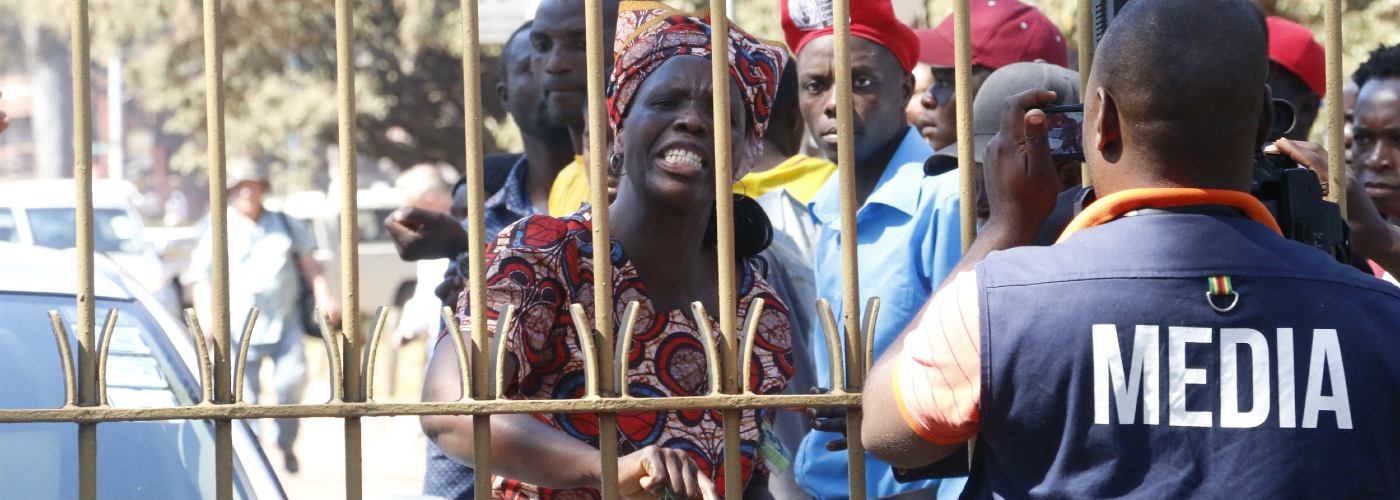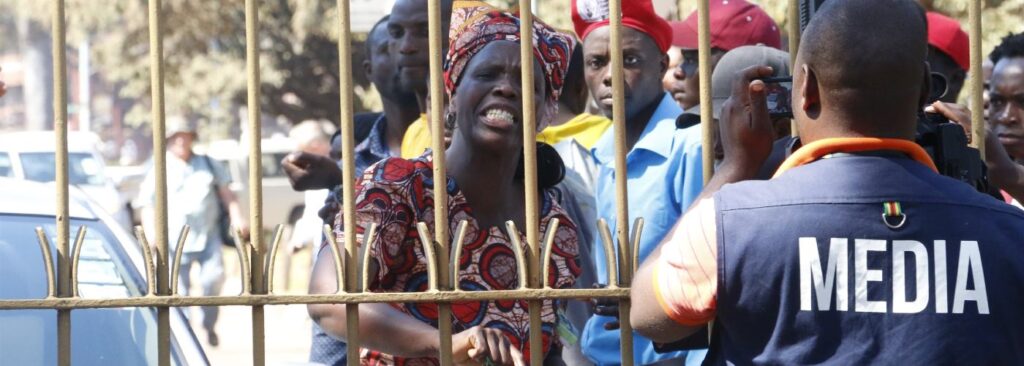1 Project title:
Connect, Defend, Act! Project – Community of Action Grant (COA)
2 Location:
Lilongwe, Malawi
3 Contact details
- Organisation: Hivos Foundation
- Email: sa-hub@hivos.org
- Response Address: 20 Philips Avenue, Belgravia, Harare.
4 Project Brief
All around the world, those in power, not only in autocratic governments but in established democracies as well, are increasingly imposing restrictions on civil society to freely express themselves, to protest against systemic injustices and to organize themselves to defend fundamental human rights. Digital tools and platforms carry the potential to create safe and brave spaces for trust-based collaboration and increased access to information, but they remain shaped by unequal access, as well as undermined by increasingly sophisticated digital surveillance and attacks by state and non-state actors.
With support from the Government of Norway through the Norwegian Agency for Development Cooperation (NORAD), Hivos is implementing the ‘Connect, Defend, Act!’ project. The project aims to respond to the issue of shrinking civic space and amplify civil society-led action in Malawi by supporting civil society actors in their efforts to defend and expand civic space. Civil society actors and rights holders who are taking action to defend and expand civic space are confronted with an array of political, institutional, legal, and societal forces actively working against their goals. Civil society actors have needs such as safe and trustworthy spaces for evidence-based learning and strategizing, strengthened capacity to respond to mounting digital attacks, and access to funding to increase organizational flexibility and resilience. The project has the following goals and three strategic objectives:
4.1 Project goal
Civil Society Actors in Malawi can positively influence the openness of and respond to changes in the civic space.
4.2 Project Objectives
-
By promoting coalition building among diverse civil society actors, including human rights defenders, rights holder-led civil society organizations, and independent media actors, grounded in civil society-led evidence gathering and knowledge production, and facilitated by context-specific communities of action.
-
By contributing to safe and inclusive digital civic spaces for sustained collaboration and action among civil society actors through localized holistic digital security capacity strengthening, knowledge production, and active referral to digital protection providers.
-
By increasing civil society actors’ flexibility to rapidly respond to changes in civic space through organizational capacity strengthening and the provision of strategic funding for sustainable action.
The project aims to strategically support relevant actors within civil society whose work actively to contribute to civic space from the perspective of different sectors and interests, particularly including groups who are marginalized within civil society, such as women, youth, marginalized persons, indigenous people, and others. Across all activities and outcomes, the project is promoting local ownership and leadership, with Hivos taking a facilitating and supporting role that emphasizes civil society actors’ agency and existing knowledge.
5 Executive Summary- Connect, Defend, Act! Baseline Study
The baseline study assessed the state of civic space in Malawi, focusing on civil society coalitions, barriers faced by actors, and organizational capacity gaps. The study revealed varying perceptions of the environment among civil society organizations (CSOs), facing challenges in participating in civic activities. Key challenges include resource shortages, legal barriers, threats, intimidation, and institutional constraints. Media actors also highlighted the importance of independent media in promoting civic space, but some felt media independence was compromised by government influence. Threats to civic space were also found, with media actors experiencing physical threats, digital attacks, and legal actions.
The study also found out that Civil Society Organizations (CSOs) in Malawi face various digital threats, including phishing, hacking, and online harassment. Despite having a somewhat safe physical environment, half of CSOs reported a mixed public perception of their work. Digital security knowledge among CSOs varied, with 16.7% rated as “Excellent,” 50% as “Fair,” and 33.3% as “Poor.” To combat these threats, CSOs have implemented measures like antivirus software, firewalls, strong password protocols, and regular training. CSOs indicated that they provide digital security training to their staff. However, there are gaps in organizational capacity for CSOs and media actors in Malawi, with only 83% having access to sustainable funding. Structural barriers, such as limited donor interest, competition, geographic isolation, and bureaucratic processes, hinder access to funds.
The study also found out that half of Civil Society Organizations (CSOs) in Malawi lack contingency plans for emergencies, indicating vulnerabilities in adapting to rapidly changing environments. CSOs felt somewhat prepared, and there were discrepancies in strategy updates, possibly due to resource constraints or inadequate capacity. CSOs’ approaches to addressing capacity gaps varied, with some focusing on internal capacity building and others on external partnerships and funding. Coalitions focused on human rights and gender equality faced challenges, including lack of trust, inadequate funding, poor coordination, and political pressure. Strengthening leadership, securing stable funding, and fostering better coordination are crucial for improving coalition effectiveness in Malawi.
6 Seeking a Partner for Community of Action Grant
Hivos is looking for a dedicated partner to collaborate in strengthening cooperation, stimulate exchange, linking, learning, and building joint actions to address the challenges of shrinking civic space-time.
Drawing from Connect, Defend, Act!’s Baseline Study particularly the “Connect” chapter, it is crucial to make sure that cohesiveness amongst Civil Society Actors are more bridging than bonding. “Bridging” refers to interactions and social capitals that bring together people of different ethnic, religious, class, age, etc. backgrounds, while “bonding” has to do with those that tie together people from similar identity backgrounds (Varshney 2002). Also, such bridging connections need to be cultivated both at the everyday quotidian and the formal associational levels. While cross cleavage interactions do not guarantee that different groups will understand and agree with each other, they help prevent intergroup violence in the event of conflicts, misunderstandings, as well as misinformation, disinformation, and provocations.
From the Hivos’ Voice, we learned that linking and learning processes enable Civil Society Actors (CSAs) to share experiences, scale successful approaches, learn from mistakes, and embrace innovative solutions. This iterative process—exploring, trying new methodologies, reflecting on outcomes, and adapting—is pivotal in navigating the current realities of shrinking civic space-time.
To support this vision, we aim to have a partner who will serve and maintain platforms for sustained exchange, learning, and joint action among Civil Society Actors, guided by local ownership and influence over policy and practice.
The primary role of Community of Action Facilitator will be to:
- Create and maintain inclusive, rights holder-led spaces to strengthen solidarity and trust among participants
- Facilitate activities, administer meeting logistics, and support collaboration
- Promote local ownership while receiving strategic support from Hivos and other CDA Partners (CDA Core Group), including comparative linking and learning across contexts and external outreach to stakeholders.
Indicative activities to be explored further by partner:
- Facilitate outreach to Civil Society Actors to build stronger cohesion
- Support Civil Society Actors’ activities (including CDA Core Group and other engaged communities/organizations/rights holders) through co-facilitation and mentoring
- Lead and participate in meetings and events to linking and learning, including to disseminate knowledge products
7 Location
Lilongwe, Blantyre, Zomba, or Mzuzu but the partner can propose other districts of target based on evidence of well-articulated situation analysis in that proposed area of implementation.
8 Procedure
Open Call
9 Overview
You can download the Annex A here.



10 Partner Clarifications
Should any partner have questions to ask or need any clarification, they should refer them in writing (which will be deemed to be by, e-mail on proposals.hubsaf@hivos.org not later than Friday 21 February 2025. Questions submitted will be issued, together with answers, through the platform which the call was published. The questions and answers as issued will give no indication of which organisation/s asked the questions. If for any reason during the call period it becomes necessary to vary the Call Documents, an Addendum will be issued to all prospective partners
Note that:
- Hivos may request further information from organizations after the submission of their concept note. Any additional information must be provided within five working days.
- The onus is on the organization to ensure that their submission is complete and meets Hivos’ requirements. Failure to comply may lead to the submission being rejected without any reason being given. Therefore, please ensure that you read this document carefully and answer all questions in full.
11 The Specifications
Specifically, we are looking for organizations that meet the following criteria:
- Registered and based in Malawi, working either at the local, regional, or national level
- Skilled and experienced in monitoring community of action programing
- Proven track record in defending human rights and civic space, particularly the rights of marginalized rights holders
- Adequate operational and financial management experience
- Clean human rights record, with no involvement in sexual violence
- Strong commitment to intersectionality, demonstrated through their work and principles
- Led by, or closely collaborating with, youth, women, and diverse groups
- Willing to challenge the status quo of Malawi’s civic space and collaborate with other stakeholders to connect, defend, and act to protect and expand civic space
12 Partners’ Responsibilities and Grant Value
The total amount of Community of Action Grants is: EUR 23,000 for one organization annually. Applications proposed by the candidates should be within this range.
Partner organization(s) will be responsible for:
- Produce an inception report for carrying out the Community of Action
- Review all relevant documents for conducting Community of Action
- Develop Community of Action design and tools, in consultation with Hivos
- Develop field work schedule (where necessary) for conducting Community of Action monitoring in consultation with Hivos
- Produce and submit to Hivos the draft report of Community of Action (per the required format and information request).
- Incorporate comments from Hivos into the report
- Finalise a high-quality Community of Action report
13 Application Deadline
The submission should be sent to proposals.hubsaf@hivos.org with the subject “Community of Action Grant” in the subject line by Friday 28th February 2025, 17:00hrs Malawi time. Only shortlisted candidates will be contacted.
14 Participation
- This is an open call, Hivos invites proposals from organizations that are legally registered/established in their state of origin and are entitled to perform the obligations of such contracts or engagements.
- To be eligible for participation in this call procedure, organizations must prove to the satisfaction of Hivos that they comply with the necessary legal, technical and financial requirements and have the ability to carry out the contract effectively.
- Any attempt by the organization to obtain confidential information, enter into unlawful agreements with competitors or influence the evaluation committee or Hivos during the process of examining, clarifying and evaluation will lead to one or more of the following; disqualification in this call, rejection of its offer(s)/bid, or legal consequences, or debarred from future calls/procurements where applicable.
- Organizations must at all times act loyally and impartially in accordance with the code of conduct of their profession. They must refrain from making public statements about the project or services without Hivos’ prior written approval. They may not commit Hivos in any way without prior written consent.
- Organizations and their staff are obliged to maintain professional secrecy; all reports, documents and information provided by Hivos are confidential and should be treated as such.
Evaluation and selection criteria
Hivos, at its sole discretion, will select the winner of this call. In order to award the call Hivos shall consider/perform the following evaluation and selection processes;

16 – Language of the procedure
- All written communications for this call procedure and contract must be in English.
17 – Disclaimer
- Hivos reserves the right to alter the date of call evaluation process stated above and the awarding of contract.
- Hivos reserves the right to alter call specifications and quantities.
- Hivos reserves the right to cancel this call process at any time and not to award any contract.
- Hivos reserves the right not to enter into or award a contract as a result of this invitation to call.
- Hivos shall consider value for money (VFM) and as such does not bind itself to accept the lowest or any call.
- Hivos shall not be liable in respect of any costs incurred by the Organization in the preparation of the offer nor any associated work effort, including the production of presentation materials, brochures, product specifications or manuals for evaluation.




